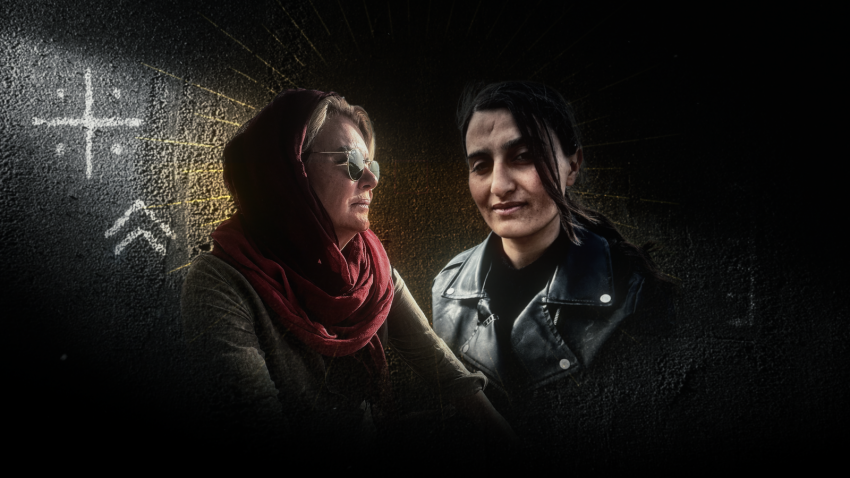It was March 2019, and we were about a kilometre away from Baghouz with the coalition troops breathing down the necks of ISIS.
Women clad in burqas scurried around holding children while men in black whizzed around on motorbikes. This was the extremists’ last stand.
A humanitarian corridor was created to allow ISIS to send out their families. To the astonishment of the watching media, thousands of people streamed out.
Wounded men were interrogated and taken to multiple prisons in northeast Syria, where many of those accused of being ISIS fighters – many of them foreigners including Britons – still are.
Those we spoke to had never seen lawyers or been allowed to speak to their families.
Among the large crowd of humanity pouring out of Baghouz, there were also Yazidis. But at that time, the focus was firmly on defeating ISIS.
A sign at the site of a Yazidi massacre reads: ‘Warning. This is the site of a mass grave’. Pic: AP
A sign at the site of a Yazidi massacre reads: ‘Warning. This is the site of a mass grave’. Pic: AP
The tracing of mass graves of their victims began a few years before the last bit of ISIS territory was recaptured. But there were considerable challenges from the off: the victims were spread across two countries, both coping with the aftermath of huge battles and billions of dollars’ worth of war destruction. Syria was still in the throes of civil war.
In 2017, the Iraqi authorities asked for help from the UN in tracking down the victims with a view to holding to account those responsible for war crimes and genocide. UNITAD was formed – a special UN investigative team that was given a budget of about $22m per year.
Within a few years, UNITAD and the Iraqi authorities had identified more than 200 mass graves in Iraq, but the UN also documented multiple challenges in identifying the remains as well as locating living relatives. It continues to be a monumental task.
Mourners preparing to bury the remains of Yazidi victims in a cemetery in Sinjar, Iraq. Pic: AP
Mourners preparing to bury the remains of Yazidi victims in a cemetery in Sinjar, Iraq. Pic: AP
The Iraqi authorities pointed out that they needed financial help and support from the international community to complete such a big task.
They also accused UNITAD of withholding evidence and being non-co-operative. There were clear differences in approach and co-ordination between the UNITAD team and the Iraqi authorities.
“UNITAD’s insistence on strict conditions for evidence sharing with Iraqi authorities ostensibly designed to uphold international standards — including the requirement that Iraq abolish the death penalty and ensure fair trials — have proven an insurmountable hurdle for the Iraqi legal system.”
Yazidis mourn together in Kocho
Yazidis mourn together in Kocho
In 2024, the Iraqi government decided not to extend the mandate of the UN investigation’s team. After seven years of investigations, there were just a handful of prosecutions for crimes against humanity and genocide – mostly in Germany and Portugal – and none in Iraq.
During this period, the Iraqi authorities have continued to execute former ISIS fighters for the crime of belonging to a terror group, which has frustrated international human rights lawyers who fear that key perpetrators who could provide evidence in war crimes and genocide trials, are being killed without due process.
For many of the survivors, it has been a bitter blow. They feel disillusioned with both the Iraqi justice system and the lack of substantial progress by UNITAD.
They complain vociferously about the lack of effort as they see it, to track down the missing or identify the dead.
To many it feels like they have been left in limbo – with no answers and in many cases no corpses to bury and mourn. Villages like Kocho lie empty and eerily silent; a testament to how little progress has been made in achieving justice for those who suffered so much.
